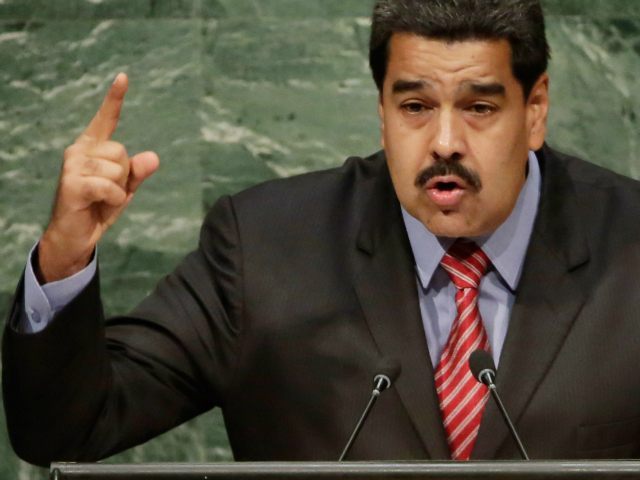Fresh off the heels of an election the world has rejected as a “sham,” Venezuela banned the opposition Democratic Unity Roundtable (MUD) party from running local candidates in a third of the nation on Tuesday.
Venezuela’s National Electoral Commission (CNE), accused of fraud by the company that sells its election technology to the government, issued a statement announcing registration this week for candidates in the 2017 regional elections scheduled for December. In its list of political parties, it adds a footnote: “In the case of the political organization MUD, it must abstain from registering candidates in Zulia, Apure, Monagas, Bolívar, Trujillo, Aragua, and Carabobo” – seven of the nation’s 23 states.
The Spanish newspaper El País notes that the MUD won overwhelmingly in the 2015 congressional elections in five of the seven states where the party has been banned.
The CNE did not offer specifics explaining the ban.
The MUD is a coalition of parties in opposition to the ruling United Socialist Party of Venezuela (PSUV), the only party allowed to run candidates in the July 30 election to create the “National Constituents Assembly,” a parallel legislature meant to usurp the power of the democratically elected National Assembly.
The MUD is ideologically diverse, featuring a number of socialist parties, and has found itself mired in an internal debate over whether to register candidates for the 2017 elections at all. Supporters of running candidates say that any presence in the government will help empower the opposition, while those opposed say that, given the proven fraudulent nature of the recent election, any participation in the system lends Maduro and his dictatorship legitimacy.
Among the most vocal supporters of placing candidates on the ballot is Henry Ramos Allup, the leader of Democratic Action, one of the surviving parties from Venezuela’s era of two-party democracy. Ramos Allup also serves as a vice president of the Socialist International and played a pivotal role in the failed dialogue with the government throughout 2016, which limited peaceful street protests while the government consolidated its power and arrested dissident leaders.
“If we do not partake in the gubernatorial elections, chavistas will win 23 governorships through forfeit, and we would also give away 335 mayorships,” Ramos Allup argued this week. “So long as there are elections, we must attempt to win them,” he said in a separate interview.
“It is inconceivable that democratic Venezuelan forces are contemplating a regional election process without removing the dictatorship from power,” María Corina Machado, head of the anti-socialist Vente Venezuela party, argued Tuesday. “There is no possible election in Venezuela with people before the CNE who make themselves accomplices of what is going on in the country.”
“If anyone thinks the regime is stronger then Venezuela, then accept their crumbs,” Machado wrote on Twitter:
1. Si alguien cree que el régimen es más fuerte que Venezuela, entonces que acepte sus migajas.
— María Corina Machado (@MariaCorinaYA) August 4, 2017
Machado has demanded the military get involved in the opposition, given that Maduro relies heavily on the brutality of the National Guard to intimidate and kill protesters – a call at least some in the military have taken seriously.
Also in Machado’s corner is Caracas Mayor Antonio Ledezma’s party, the Brave People Alliance (ABP), which has officially announced a boycott of the election. Ledezma, arrested but not charged with a crime, was dragged out of his house arrest last week after publishing a video criticizing the MUD for letting “egos” get in the way of challenging the Maduro regime.
Other Venezuelan observers appear to support boycotting the elections, as participating in them will appear to accept their legitimacy after a study found that the CNE committed fraud in July. “So long as Nicolás Maduro is government, there will never be free elections in Venezuela,” writes El Nacional columnist Gustavo Tarre Briceño. “The government will not lose any more elections. There will simply not be any more political votes or, if there are, they will be just as fraudulent.”
Orlando Avendaño, a Venezuelan student, argues a similar point in the Pan-American Post. “This has become a matter of principles, ethics, and rationality. This is the moment that leaders, with courage, distinguish themselves from those who openly bet on cohabitation with a tyrannical regime and the recovery of spaces to benefit themselves and prolong the agony.”
Venezuelan NGOs documented at least 16 killed during election-related violence on the weekend of July 30.

COMMENTS
Please let us know if you're having issues with commenting.